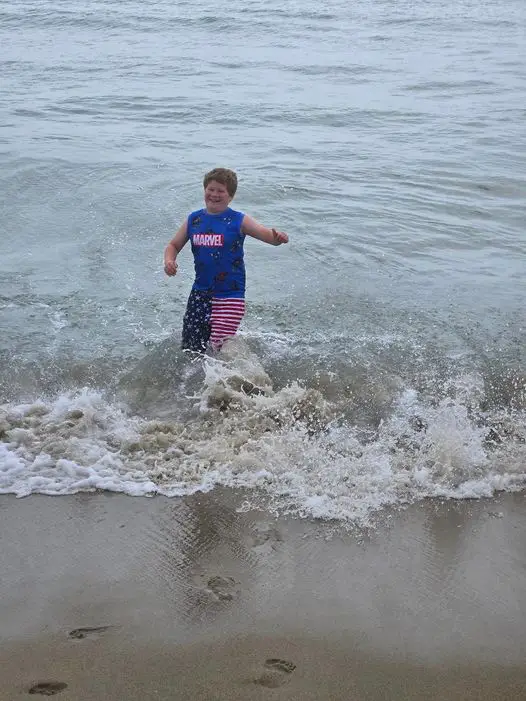Heather Cassini, a mother from Massachusetts, is sharing a heartfelt warning with parents everywhere after her 10-year-old son, Declan, collapsed at Hampton Beach, New Hampshire, due to a lesser-known danger—hypothermia in warm weather.
While beach days are a perfect way to cool off during the scorching summer, the ocean can carry hidden risks. On July 4, what began as a fun family outing quickly turned into a frightening ordeal that left Cassini and her family shaken.
A Sudden Collapse
The day started like any other beach day, with families enjoying the sun, sand, and waves. Cassini, 40, brought her family to Hampton Beach to celebrate Independence Day, never anticipating what would happen next. Declan had been playing in the ocean for some time when he began to feel unwell.
“At first, I thought it was just something mild. Maybe he’d eaten too much breakfast before playing in the waves,” Cassini explained. However, as they started walking back towards their spot, Declan’s condition quickly deteriorated. He became disoriented and, to her shock, collapsed onto a nearby sunbather.
Despite briefly getting back on his feet, Declan stumbled again, alarming everyone nearby. “I’m pregnant and frantically trying to pick him up,” Cassini recounted. “He’s going in and out of consciousness and vomiting. And he was so pale.”
The Life-Saving Actions of Beachgoers
Fortunately, a group of women who were nearby noticed the emergency and leapt into action. Several were nurses who helped stabilize Declan until paramedics arrived. The first responders quickly checked his vital signs and worked to keep him conscious and warm.
Cassini vividly recalls how they “checked his vitals and worked tirelessly to keep him stable,” adding, “God bless all the people around us. There were so many nurses who jumped in to help.”
The moment Declan began speaking again after what seemed like an eternity, Cassini felt a wave of relief wash over her. He gradually regained consciousness and began to feel better. The family decided to take him to the car to rest and recover.
An Unexpected Diagnosis: Hypothermia
It wasn’t until later that they learned the cause of Declan’s sudden collapse. Despite the warm summer air, the ocean water that day was a chilling 52 degrees. Declan, like many children, seemed immune to the cold while playing, but his body was undergoing a dangerous reaction to the cold water—hypothermia.
“I had no idea this could happen,” Cassini said in a viral Facebook post that has since garnered widespread attention. “You always hear about sunburns and dehydration, but I never once considered cold shock, especially in the middle of summer.”
Hypothermia occurs when the body loses heat faster than it can produce it, causing a dangerous drop in core temperature. While many associate it with freezing weather, cold water immersion can lead to hypothermia even in warm environments. In fact, cold shock can occur in water temperatures below 70 degrees Fahrenheit, making ocean activities risky even in seemingly ideal conditions.
The Importance of Awareness
Now that Declan has fully recovered, Cassini is determined to spread awareness about the risks of cold water immersion and hypothermia, especially for children who often don’t notice the temperature as adults do.
“Just a warning to those with kids who feel no cold and love the water,” she shared. “Just because they can handle it doesn’t mean they can handle it.”
This critical lesson serves as a reminder that parents should remain vigilant while at the beach. While sunscreen, hydration, and keeping an eye on the waves are essential, it’s also crucial to consider the temperature of the water. Even if children appear comfortable, their bodies may be struggling to maintain normal body temperatures in cold water, putting them at risk.
Cold Water Shock: The Hidden Summer Threat
Hypothermia from ocean water is an often-overlooked threat, especially during the warmer months. According to experts, cold water shock can occur in just minutes, depending on the water temperature and the individual’s body condition. Children are particularly vulnerable due to their smaller body mass and inability to regulate body heat as effectively as adults.
“When you think of dangers at the beach, things like sunburn, jellyfish stings, or rip currents come to mind,” says Dr. Emily Reid, a pediatrician specializing in child safety. “But cold water shock is a silent threat, and many people aren’t even aware of it.”
Children often don’t realize they’re cold until it’s too late, as they become engrossed in play. It’s essential for parents to keep track of how long their children are in the water and be mindful of the ocean’s temperature, even on a hot day.
A Final Word of Caution
Cassini’s experience underscores the importance of being prepared for all kinds of risks, even those we may not initially think about. Her story serves as a stark reminder to stay informed and cautious when it comes to beach safety.
“We should never assume everything is fine just because the air is warm,” Cassini emphasized. “I’ll never forget that day, and I hope our story helps prevent something similar from happening to someone else.”
In sharing her story, Cassini hopes to prevent other families from experiencing the same terrifying ordeal. Awareness and preparedness can save lives. So, the next time you head to the beach, make sure to not only protect yourself from the sun but also from the potential dangers lurking in the water—because, as Cassini’s experience shows, summer doesn’t always mean safety.

